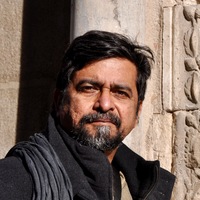 |
| Prof. Ashwani Vasishth |
By Karyssa F. Cendana
For the community experiential assignment, I attended Professor Ashwani Vasishth’s discussion on “Effective Climate Communication” at Ramapo College’s online conference on the Youth Climate Movement. I chose to attend this session because I found it interesting that there was an entire discussion dedicated to how to talk to people about climate change. For the most part, I had always been under the impression that to convince people to take the issue of climate change seriously, we need to ensure that they truly understand the severity of the crisis. The method by which people choose to do so may vary, but overall, I thought that discussing the tragedy and chaos that climate change brought about was the most effective way to command the attention of skeptics.
Ashwani’s approach surprised me. Though I have never had the pleasure of being taught by him in class, I had heard him speak numerous times prior to this event. I had wrongfully assumed that he had little tolerance for skeptics and favored focusing on the real destruction that climate change can cause when addressing the public.
Instead, his philosophy on climate education was a lot less harsh than I had expected it to be. First, he emphasized the importance of clearing any misconceptions about climate change or its related terms. For example, he differentiated between “regular” and “rampant” carbon dioxide in order to combat the argument that carbon dioxide is natural, therefore it isn’t a climate issue. He said that while it is true that carbon dioxide naturally occurs in the atmosphere, it typically does so in a particular “balance” with a number of other elements/substances. Anthropogenic or “rampant” carbon dioxide overthrows this balance, leading to a plethora of issues (including global warming). By defining terms and educating someone who isn’t familiar with climate science before bombarding them with “negatives,” one can help to better transition someone’s thought process on climate change.
Another important point that Ashwani made was the dismantling and reconstruction of the “greenhouse metaphor” when discussing the greenhouse effect. He claims that this terminology can sometimes be confusing for people who aren’t familiar with climate science, and that it could be more widely understood as a “heat-trapping blanket” which reflects heat back to earth. My understanding of this claim is that the word “greenhouse” has a positive connotation, which may downplay the severity of global warming or even cause some people to consider the argument that global warming is good for the environment.
Finally, Ashwani discussed the importance of working to change the way people view their relationship with the environment. When making this point, he used the ocean as a great example. “We think of the ocean as a resource,” he said. “so we treat it as such.” This idea can be applied to the many different ecosystems that are present on earth, and this mindset is part of what makes humans so detrimental to the environment. As opposed to seeing the environment as something we should be in harmony and balance with, humans view the environment as a resource--a tool. When we think of something existing for the sole purpose of being there for us to use, we lack feeling any sort of connection or sympathy for harming it in any way. It is because many people lack this connection that they often don’t feel guilty for not living sustainably. In some cases, this can even lead to people thinking they aren’t doing anything wrong in the first place.
My biggest takeaway from this discussion is that the fight against climate change is not a battle between believers and non-believers. I chose to be an environmental science student because I wanted to make a difference and “be on the right side of history,” but the more I learn, the more I realize that I chose this path for the wrong reason. Moving forward, I now understand that the battle against climate change isn’t about winning an argument and proving people wrong for the greater good. Instead, it’s about working to bring people together so that we can acknowledge the relationship we must maintain between ourselves and the earth.
No comments:
Post a Comment